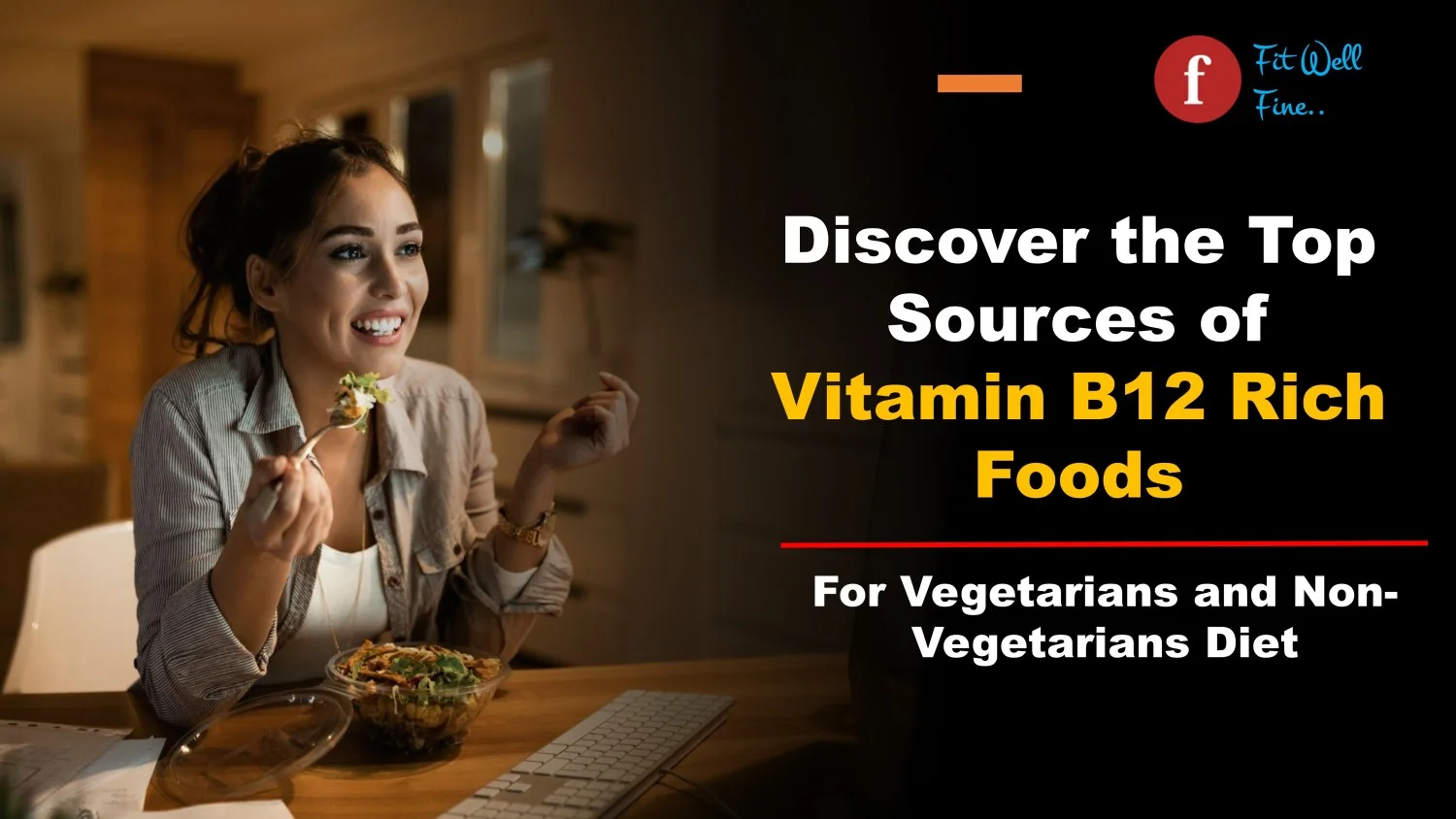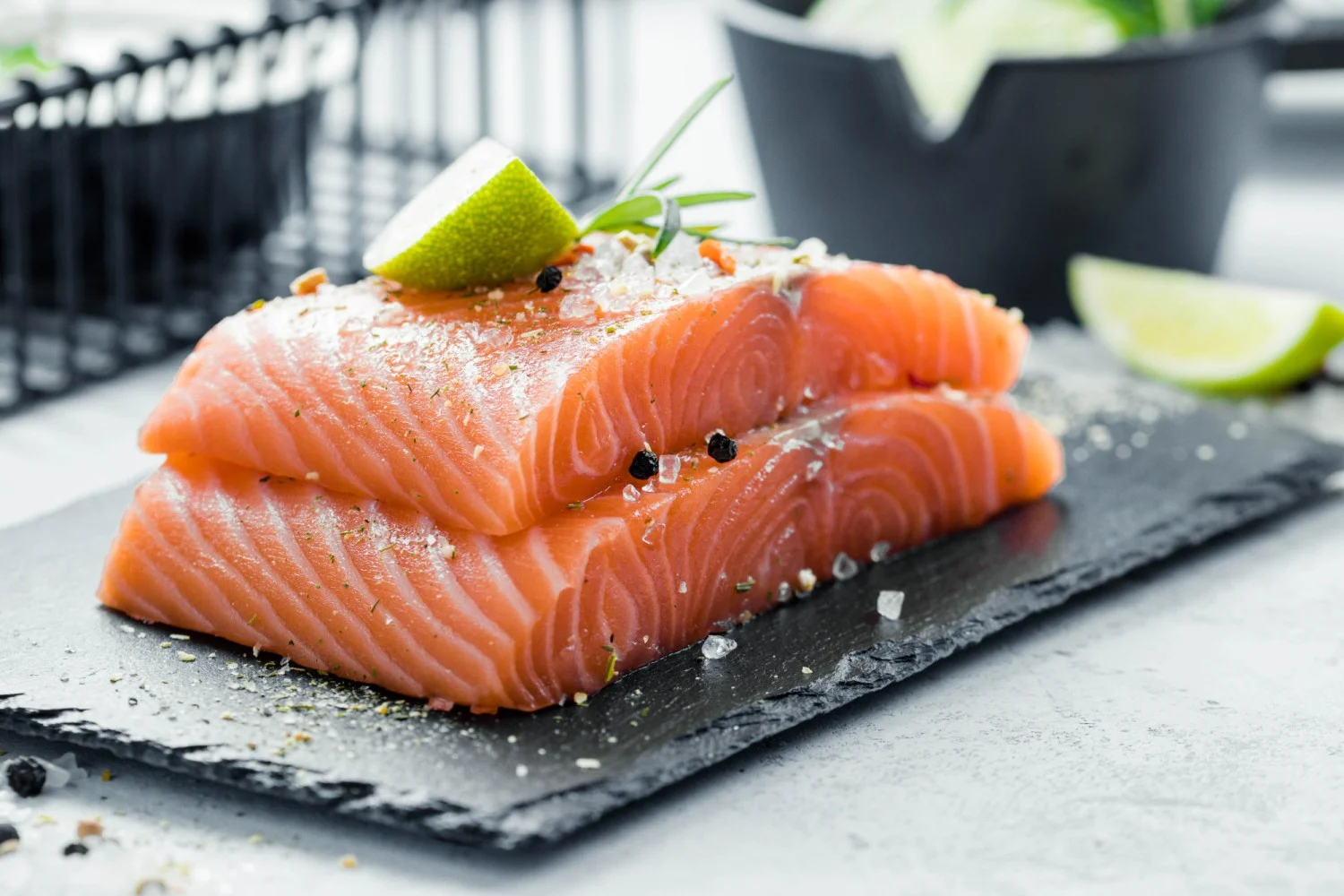Vitamin B12 is an essential nutrient that plays a crucial role in the normal functioning of the brain and nervous system. It also aids in the formation of red blood cells and DNA synthesis. The deficiency of vitamin B12 can lead to serious health issues, including anemia, fatigue, depression, and nerve damage. Therefore, it is essential to consume enough vitamin B12 to maintain optimal health. In this article, we will discuss the top sources of vitamin B12 rich foods for both vegetarians and non-vegetarians.
Understanding Vitamin B12
What is Vitamin B12?
Vitamin B12, also known as cobalamin, is a water-soluble vitamin that is essential for our body’s functioning. It is involved in the production of red blood cells, DNA, and helps maintain healthy nerves. Vitamin B12 also helps prevent a type of anemia called megaloblastic anemia, which can make you tired and weak (1).
Why is Vitamin B12 important for us?
Vitamin B12 plays several important roles in your body, including – (2)
- formation of red blood cells,
- energy production
- DNA synthesis,
- the proper functioning of the nervous system, and
- myelination
A deficiency in vitamin B12 can cause a range of symptoms, including fatigue, weakness, tingling or numbness in the hands and feet, difficulty walking, memory loss, and depression (3).
How much Vitamin B12 do you need?
The recommended daily intake of Vitamin B12 for adults is 2.4 mcg per day. However, pregnant or breastfeeding women may require more.
The best way to ensure you are meeting your daily B12 requirements is by consuming B12 fortified foods or supplements (1).
Top Vitamin B12 Rich Foods for Vegetarians

Plant based foods have no vitamin B12 unless they are fortified (1). Therefore, vegetarians and vegans can get enough vitamin B12 from plant-based fortified foods.
Fortified foods are those that have nutrients added to them that don’t naturally occur in the food. These foods are meant to improve nutrition and add health benefits (4).
Here are 7 Plant-Based Sources of Vitamin B12 for Vegetarians-
Fortified Nutritional Yeast
Fortified nutritional yeast is a type of yeast that is rich in vitamin B12 and folic acid (B9), both of which help your body make and maintain your DNA and red blood cells (5)
In addition to being a good source of vitamin B12, nutritional yeast is also high in protein and fiber. It is also low in fat and calories, making it a great addition to a healthy diet(6).
Studies reveal that nutritional yeast contains the powerful antioxidants glutathione and selenomethionine (7). These compounds may help protect your cells from damage caused by free radicals and heavy metals and help your body eliminate environmental toxins (8).
Nutritional yeast can be purchased in the form of flakes or powder and can be used as a seasoning or condiment. It has a cheesy, nutty flavor that is often compared to Parmesan cheese. Nutritional yeast can be added to salads, soups, roasted vegetables, pasta dishes, and more.
Fortified Tempeh
Tempeh is typically made up of fermented soybeans, wheat, or both. It can be prepared in a variety of different ways and is high in nutrients, making it a popular vegetarian source of protein. (9).
The fermentation process used to make tempeh increases the bioavailability of vitamin B12, making it easier for the body to absorb.
Tempeh can be used as a meat substitute in a variety of dishes, including stir-fries, sandwiches, salads, and tacos. It has a nutty, earthy flavor that pairs well with a variety of different ingredients.
Fortified Nori Seaweed
Fortified nori seaweed is a type of red algae that is commonly used in Japanese cuisine, and it is also a good source of vitamin B12. (10)
Nori seaweed is also a good source of other nutrients, including protein, fiber, vitamins, and minerals.
While nori seaweed is a good source of vitamin B12, it is important to note that the bioavailability of vitamin B12 from seaweed is not as high as it is from animal products or fortified foods. This means that the body may not be able to absorb all of the vitamin B12 from seaweed. Therefore, it is important for vegans and vegetarians to consume a variety of B12-rich foods or take B12 supplements to ensure that they are getting enough of this important nutrient.
Nori seaweed can also be used in a variety of dishes, such as soups and salads, making it a tasty and nutritious addition to any vegetarian or vegan diet.
Natural Chlorella
Chlorella is a type of green algae that is often referred to as a “superfood” because it is a rich source of many different nutrients, including vitamin B12 (11, 12). However, it is important to note that the form of vitamin B12 found in chlorella is not the same as the form found in animal products, and it is not clear how well the body can absorb and use this form of vitamin B12.
One tablespoon of chlorella provides up to 10-50 mcg of Vitamin B12.(13)
While chlorella is a good source of other nutrients, including protein, iron, and antioxidants, it may not be a reliable source of vitamin B12 for vegans and vegetarians. It is important for people following these diets to consume a variety of B12-rich foods or take B12 supplements to ensure that they are getting enough of this important nutrient.
Fortified Shiitake Mushrooms
Shiitake mushrooms are a type of mushroom that does not naturally contain vitamin B12. However, some brands of shiitake mushrooms may be fortified with vitamin B12, which is a nutrient that is important for the proper functioning of the nervous system and the production of red blood cells.
In addition, shiitake mushrooms are also a good source of other nutrients, including protein, fiber, vitamins, and minerals. (14)
If you’re looking for a plant-based source of vitamin B12, fortified shiitake mushrooms can be a good option. However, it’s important to check the label or do some research to find out which brands or products are fortified and how much B12 they contain.
Shiitake mushrooms can be used in a variety of dishes, including soups, stews, stir-fries, and pasta dishes. They have a rich, savory flavor that pairs well with a variety of different ingredients.
Fortified Cereals
Fortified cereals are another good source of vitamin B12, especially for those who follow a plant-based diet.
This food is made by adding vitamins and minerals to the cereal during the manufacturing process. This includes adding vitamin B12 to the cereal.
Breakfast cereals are commonly fortified with the following nutrients (15, 16)-
- vitamin A
- thiamine (vitamin B1)
- riboflavin (vitamin B2)
- niacin (vitamin B3)
- vitamin B6
- vitamin B12
- vitamin D
- folic acid
- zinc
- iron
- calcium
Eating a serving of fortified cereal can provide a significant amount of your daily vitamin B12 requirement.
The amount of vitamin B12 in fortified cereals can vary depending on the brand and type of cereal. It is important to read the nutrition label to determine the amount of vitamin B12 in the cereal.
Use fortified plant milks in your morning cereal, smoothies, or coffee for a tasty and nutritious boost.
Fortified plant milk
Most plant milks, like almond milk, soy milk and coconut milk, are fortified with B12.
The amount of vitamin B12 in fortified plant milk can vary depending on the brand and type of milk. However, a typical serving of fortified plant milk can provide around 1 microgram of vitamin B12, which is about 42% of the recommended daily intake for adults.
In addition to being a good source of vitamin B12, fortified plant milk is also a good source of other nutrients, including calcium, vitamin D, and protein (in some varieties). It can be used in a variety of ways, including as a substitute for dairy milk in recipes or as a standalone beverage.
While fortified plant milk is a good source of vitamin B12 for vegans and vegetarians, it is important to note that not all plant-based milks are fortified with this nutrient. It is important to check the label of the milk to ensure that it has been fortified with vitamin B12.
See more- Quick and Easy Ways to Eliminate Bitter Taste in Your Mouth
Best Vitamin B12 foods for non vegetarians

Here are 5 non-vegetarian sources of Vitamin B12 rich foods: (17, 18, 19, 20, 21)
- Shellfish: Shellfish such as clams, oysters, and mussels are rich in vitamin B12. For example, 100 grams of clams can provide up to 98.9 mcg of vitamin B12.
- Fish: Fatty fish like salmon, trout, and tuna are good sources of vitamin B12. For instance, a 100-gram serving of salmon provides around 4.9 mcg of vitamin B12.
- Meat: Beef, chicken, and pork are also rich in vitamin B12. A 100-gram serving of beef provides around 2.1 mcg of vitamin B12, while the same serving size of pork provides around 0.75 mcg of vitamin B12.
- Animal liver and kidneys: Organ meats are some of the most nutrient-packed foods. Liver and kidneys, especially from lamb, are rich in vitamin B12. A 3.5-ounce (100-gram) serving of lamb liver provides an incredible 3,571% of the Daily Value (DV) for vitamin B12
- Eggs: Eggs are another good source of vitamin B12. One large egg contains around 0.6 mcg of vitamin B12.
Supplements for Vitamin B12

If you are struggling to get enough vitamin B12 through your diet, supplements are an excellent option.
Vitamin B12 supplements come in various forms, including tablets, capsules, and sprays. It is essential to choose a high-quality supplement that is easy for your body to absorb.
There are several forms of vitamin B12 supplements available, including: (22, 23, 24, 25).
- Cyanocobalamin: This is the most common and widely available form of B12 supplement. It is usually taken in tablet or capsule form and can also be found in some fortified foods.
- Methylcobalamin: This form of B12 is more easily absorbed and used by the body than cyanocobalamin. It is often used in sublingual (under the tongue) supplements or in liquid form.
- Hydroxocobalamin: This is another form of B12 that can be found in some supplements. It is sometimes used in injectable form to treat severe B12 deficiency.
When choosing a B12 supplement, it is important to consider the dosage, form, and quality of the product. Consult with a healthcare professional to determine the appropriate dosage and form for your individual needs.
How to Incorporate These Foods into Your Diet?
Here are some ways to incorporate B12 foods into your diet:
-
Eat animal-based foods: If you’re not a non-vegetarian, you can easily get B12 from animal-based foods such as fish, meat, poultry, dairy products, and eggs. For example, a single serving of beef liver provides more than 1,000% of the recommended daily value of B12.
-
Eat fortified foods: Many plant-based foods are now fortified with B12, such as plant-based milk, breakfast cereals, and nutritional yeast. Check the labels of these products to make sure they’re fortified with B12.
-
Consider fortified nutritional yeast: Nutritional yeast is a popular vegan source of protein and is often fortified with vitamin B12. It can be sprinkled on top of many dishes, such as pasta, salads, and roasted vegetables.
-
Consume fermented foods: Some fermented foods, such as tempeh, miso, and kombucha, can contain B12. However, the amount of B12 in these foods can vary widely, so they shouldn’t be relied upon as a primary source of the nutrient.
- Take B12 supplements: If you’re unable to get enough B12 from your diet, you can take B12 supplements in the form of tablets, capsules, or sublingual drops. However, make sure to consult your doctor or a registered dietitian before taking any supplements.
How to Increase B12 Absorption
Even if you are consuming plenty of vitamin B12, your body may not be absorbing it efficiently. To increase B12 absorption, consuming foods that are rich in folate, such as leafy green vegetables, legumes, and fortified cereals, can help increase B12 absorption.
Recognizing the Symptoms of Vitamin B12 Deficiency

If you are not getting enough vitamin B12 in your diet, you may experience a range of symptoms. These may include- (26, 27)
- fatigue,
- weakness,
- tingling sensations,
- problems with the digestive system,
- a sore tongue or mouth ulcers,
- breathlessness,
- feeling faint or dizzy,
- depression,
- mood swings,
- a decline in memory, judgment, and understanding,
- pale skin loss of appetiteand,
- memory problems.
If left untreated, a B12 deficiency can lead to more severe symptoms such as nerve damage and anemia.
Read more- How to Stop Cough at Night: 12 Best Home Remedies
Read more- 10 Natural Ways to Get Rid of Red Eyes Without Eye Drops
Conclusion
Incorporating vitamin B12 rich foods into your diet is crucial for maintaining good health. Both vegetarians and non-vegetarians can get enough vitamin B12 by consuming a balanced diet that includes animal-based or plant-based sources of vitamin B12.
Vitamin B12 is primarily found in animal-based products such as shellfish, fish, beef, chicken, pork and Eggs, but there are some plant-based foods that can provide sufficient amounts of this essential nutrient for vegetarians.
Good sources of vitamin B12 for vegetarians include nutritional yeast, fortified cereals, tempeh, nori seaweed, chlorella, shiitake mushrooms, and fortified plant milk. However, it is important to note that the amount of vitamin B12 in these foods can vary, and vegetarians may still need to consider taking supplements or consuming fortified foods to ensure they are meeting their daily vitamin B12 requirements.
It is recommended that vegetarians consult with a healthcare provider or dietitian for personalized recommendations on meeting their nutrient needs.
FAQs
Can I get enough B12 from plant-based sources alone?
A. While it is possible to get enough B12 from plant-based sources, it can be challenging. Fortified foods, supplements, and fermented foods are all good options for vegetarians.
How do I know if I have a B12 deficiency?
A. If you are experiencing symptoms such as fatigue, weakness, and tingling sensations, you may have a B12 deficiency. A simple blood test can confirm a deficiency.
Can too much B12 be harmful?
A. While it is rare to experience negative side effects from consuming too much B12, taking high doses of supplements can lead to symptoms such as headaches, dizziness, and nausea.
What is the best way to consume B12 supplements?
A. The most effective way to consume B12 supplements is to take them sublingually, meaning under the tongue. This allows the vitamin to be absorbed directly into the bloodstream.
Disclaimer : The above information is given purely from educational point of view. This information should not be used for diagnosis or treatment of any disease without professional medical advice. Apart from this, before adding or removing anything in your diet, please consult a qualified doctor or dietitian. If you think you may have a medical emergency, immediately call your doctor.

